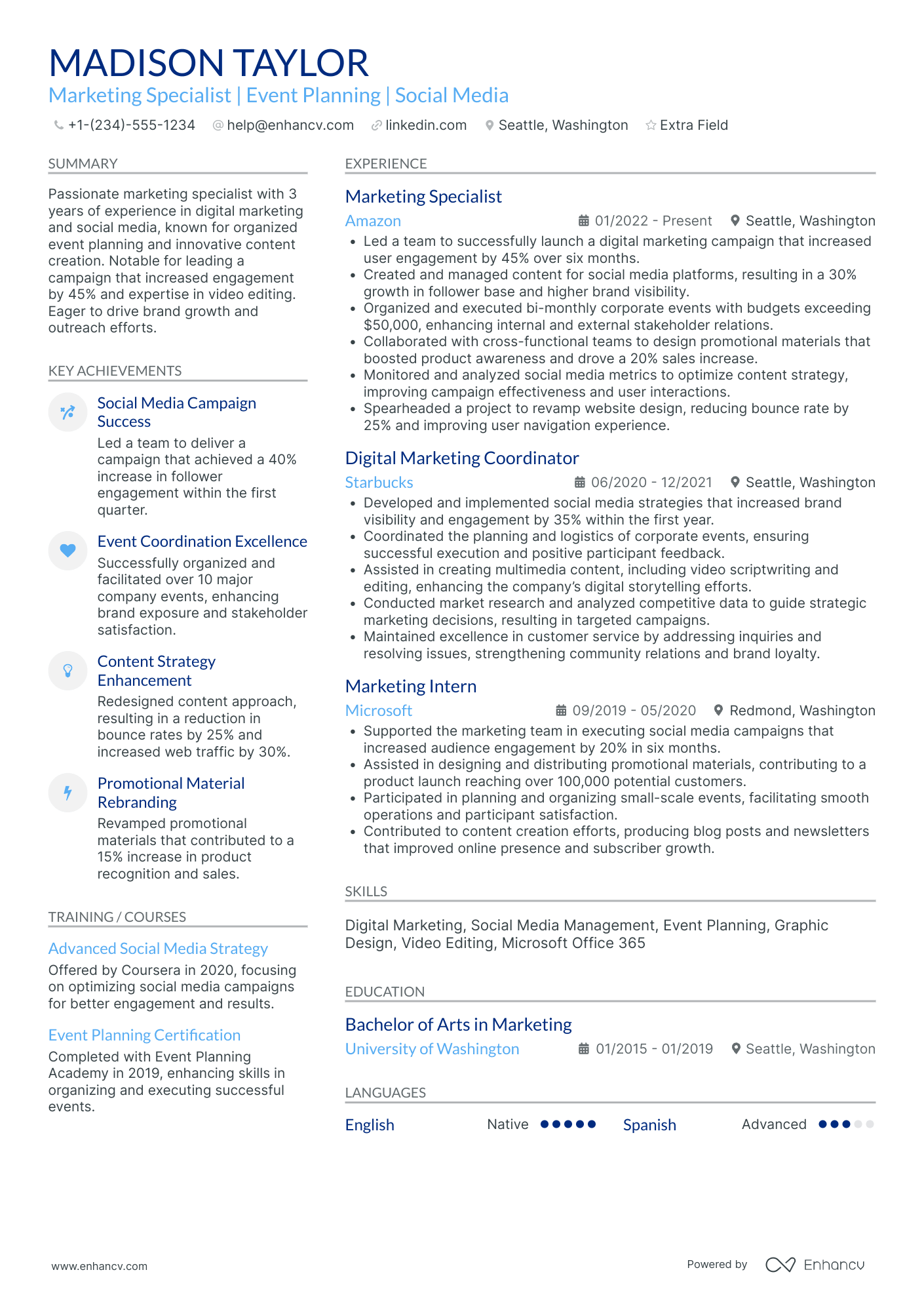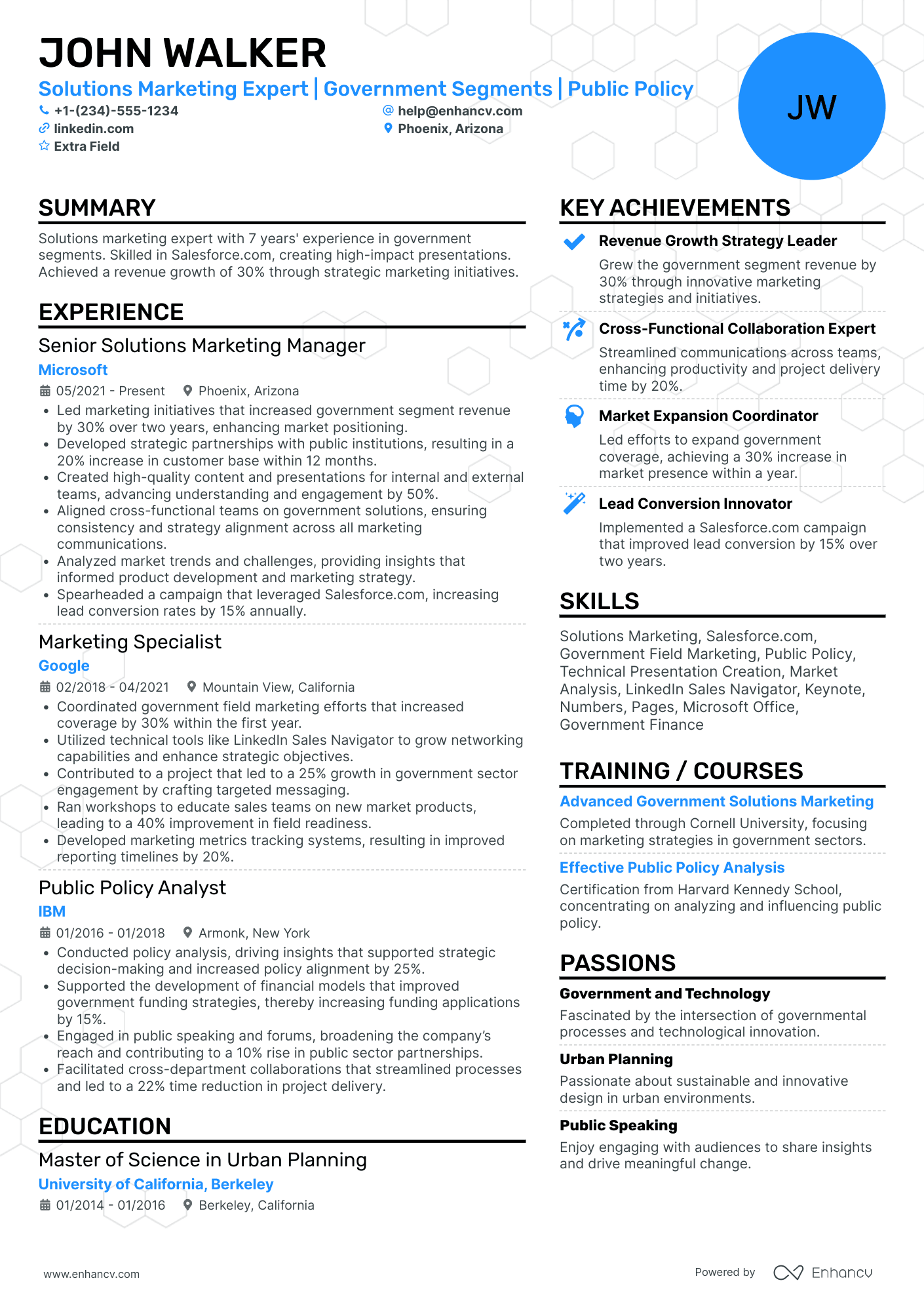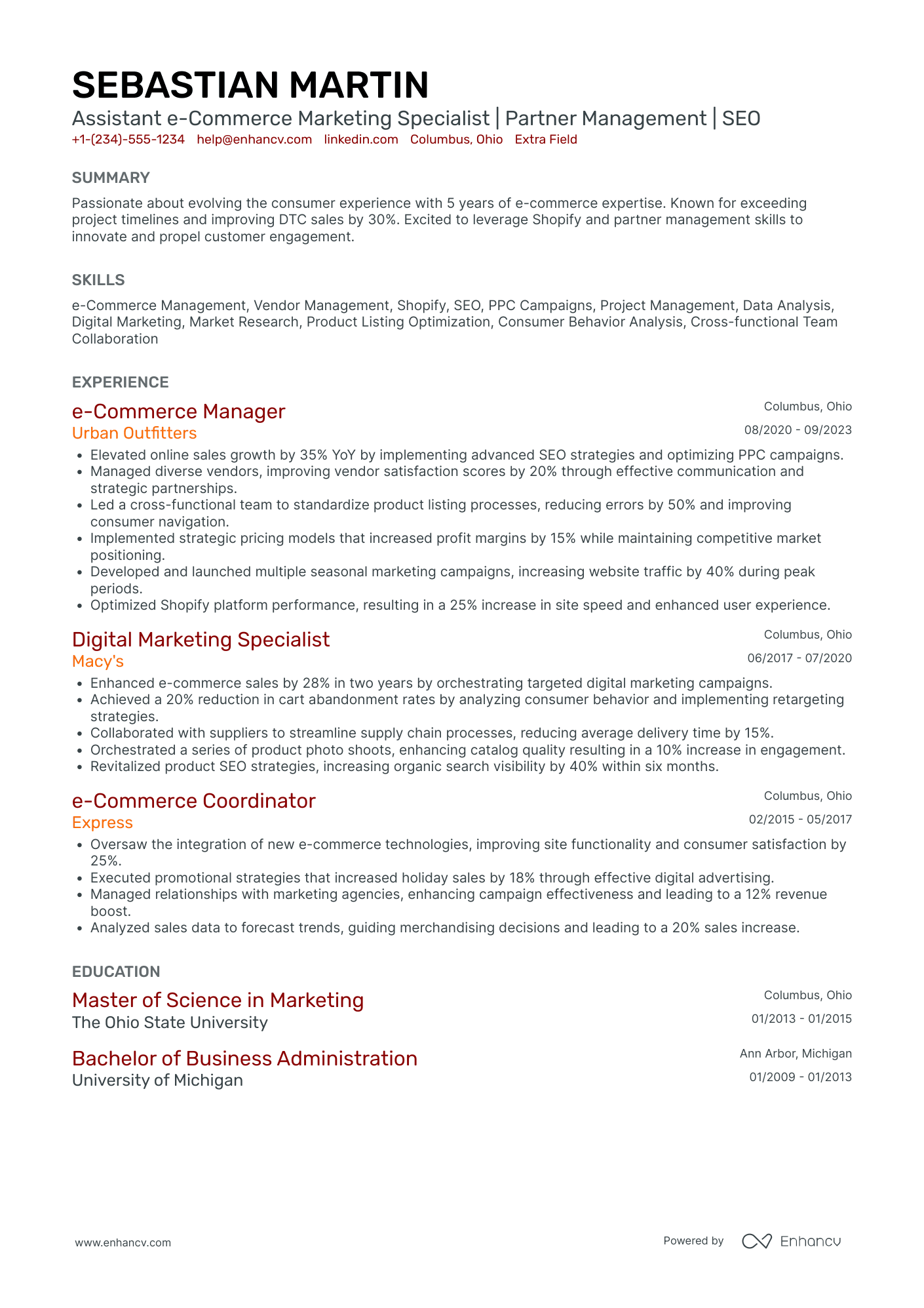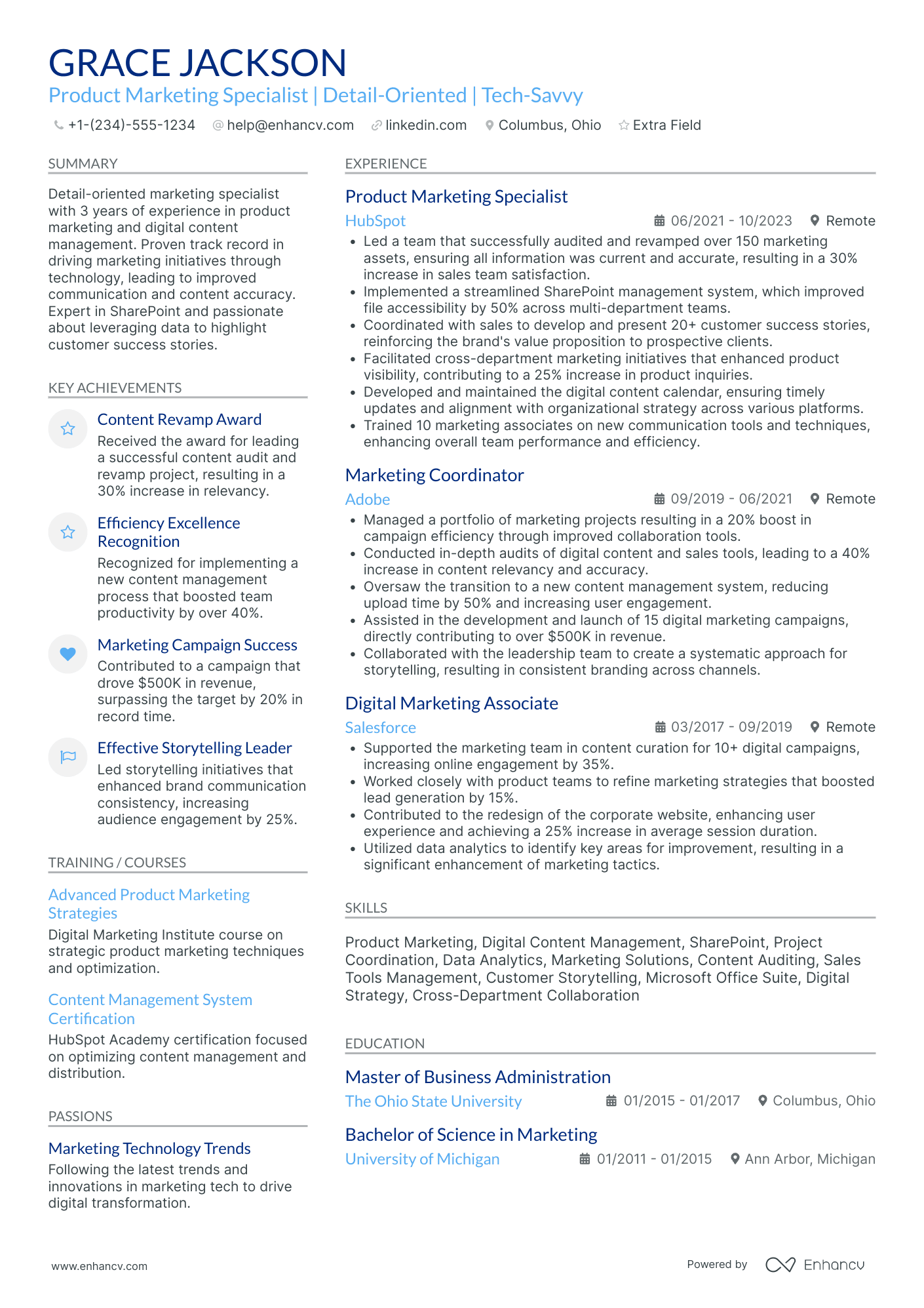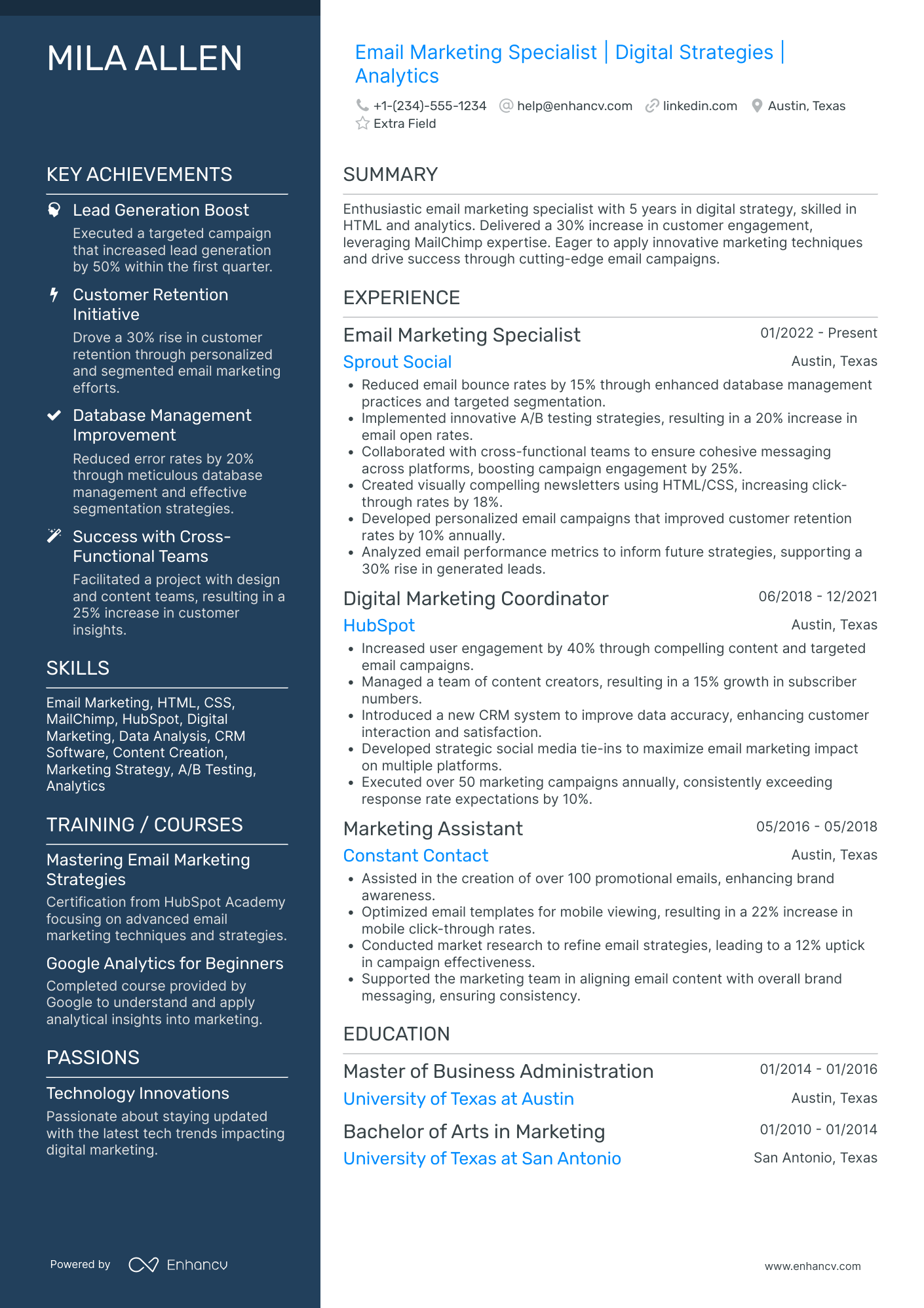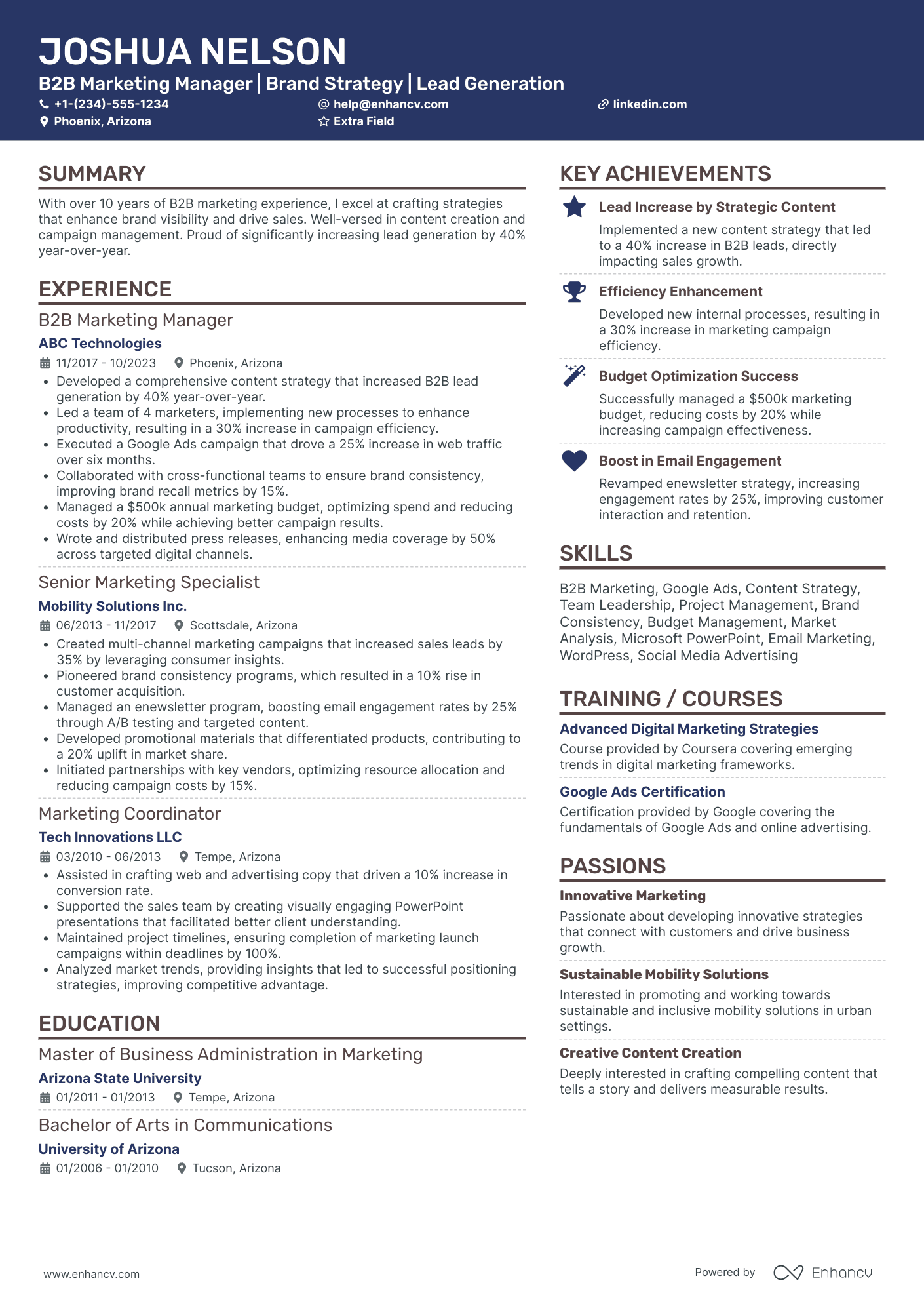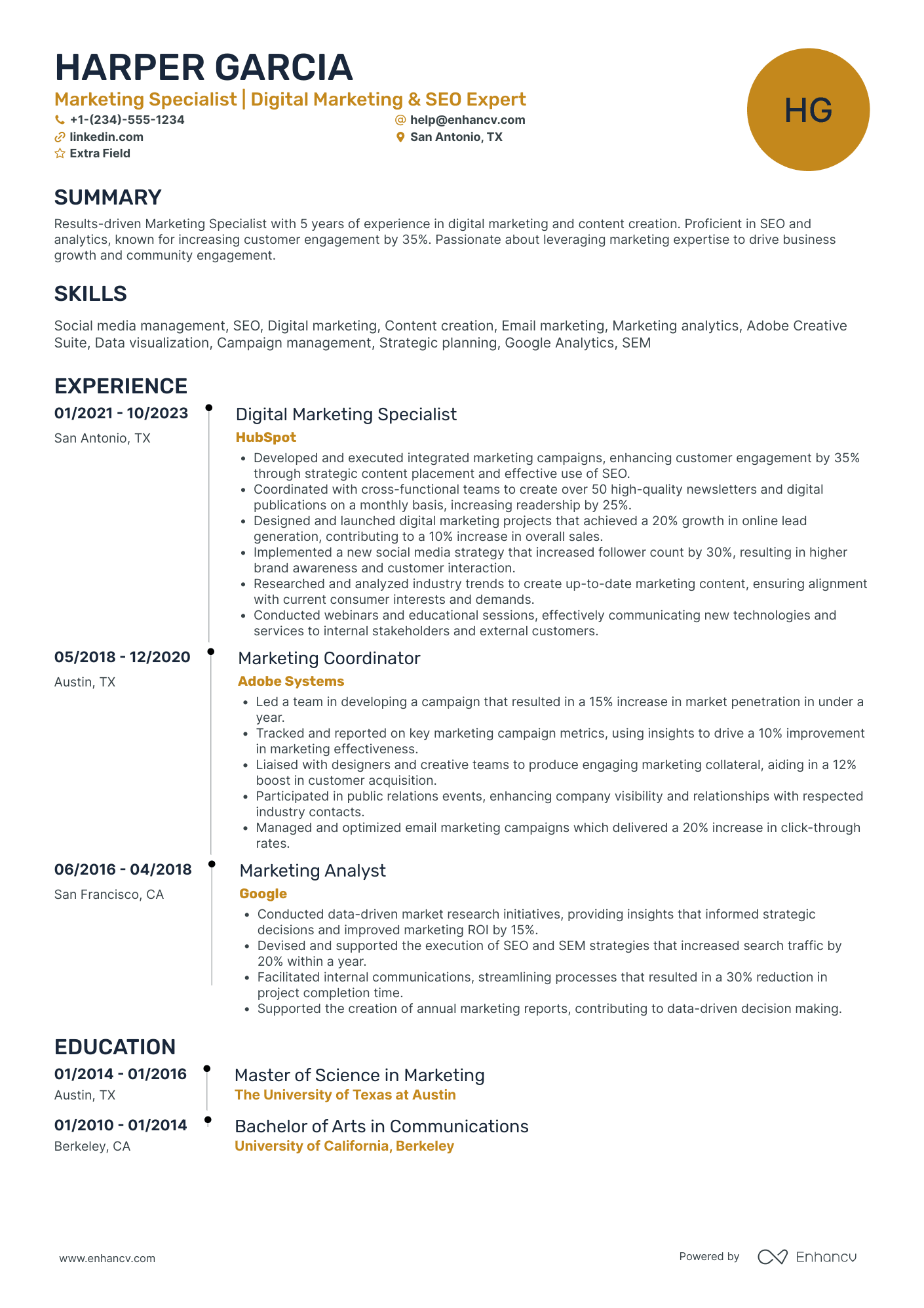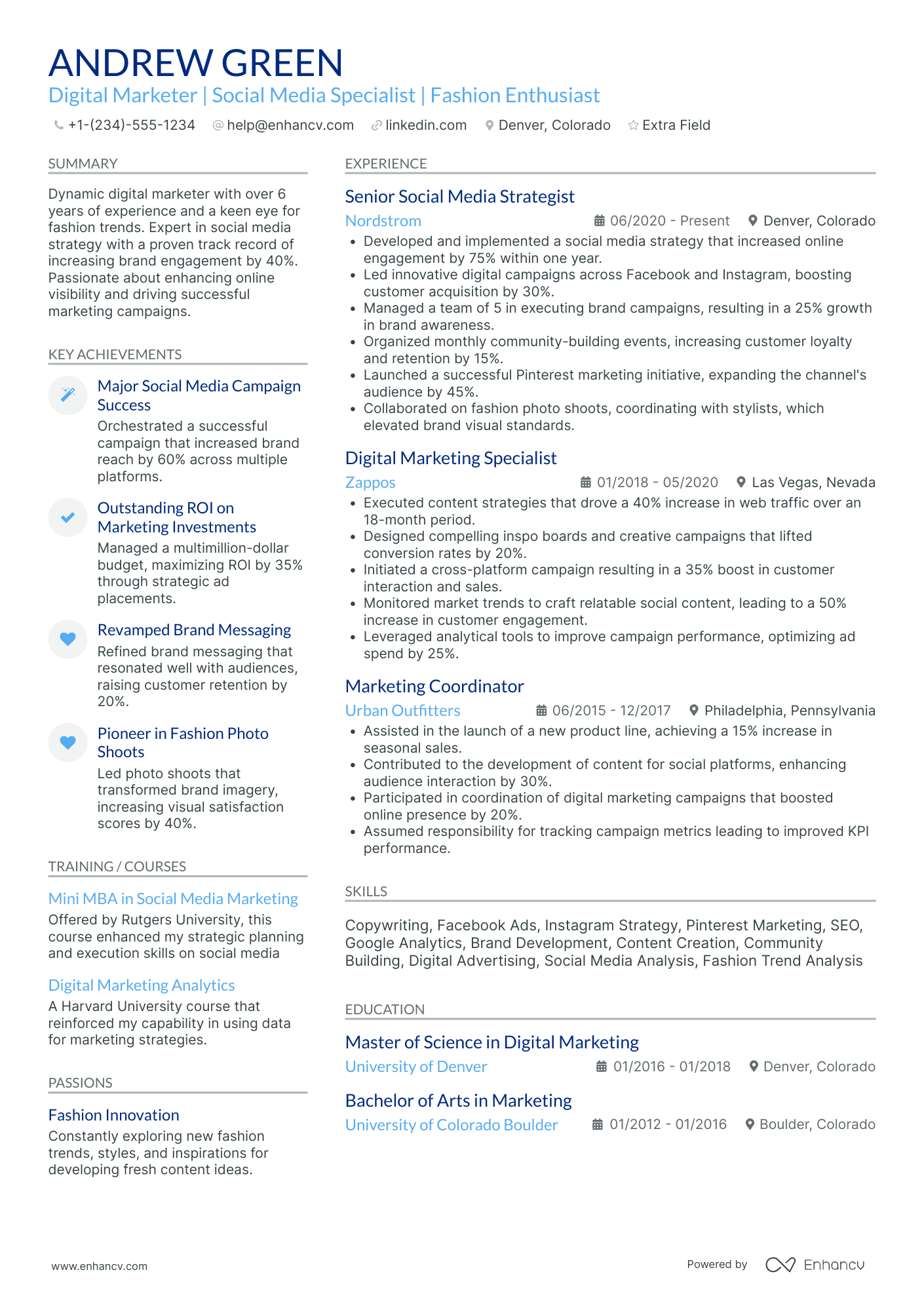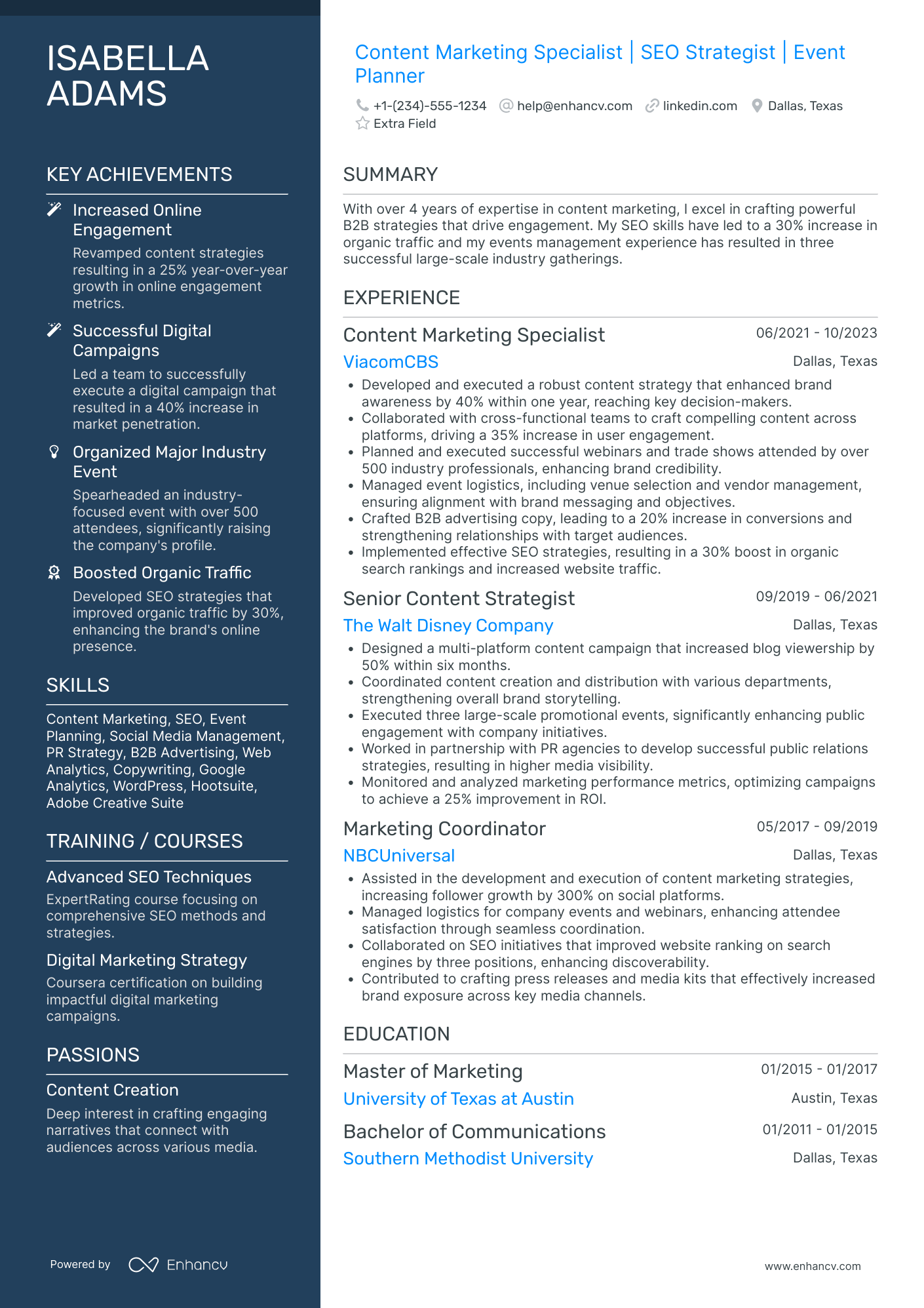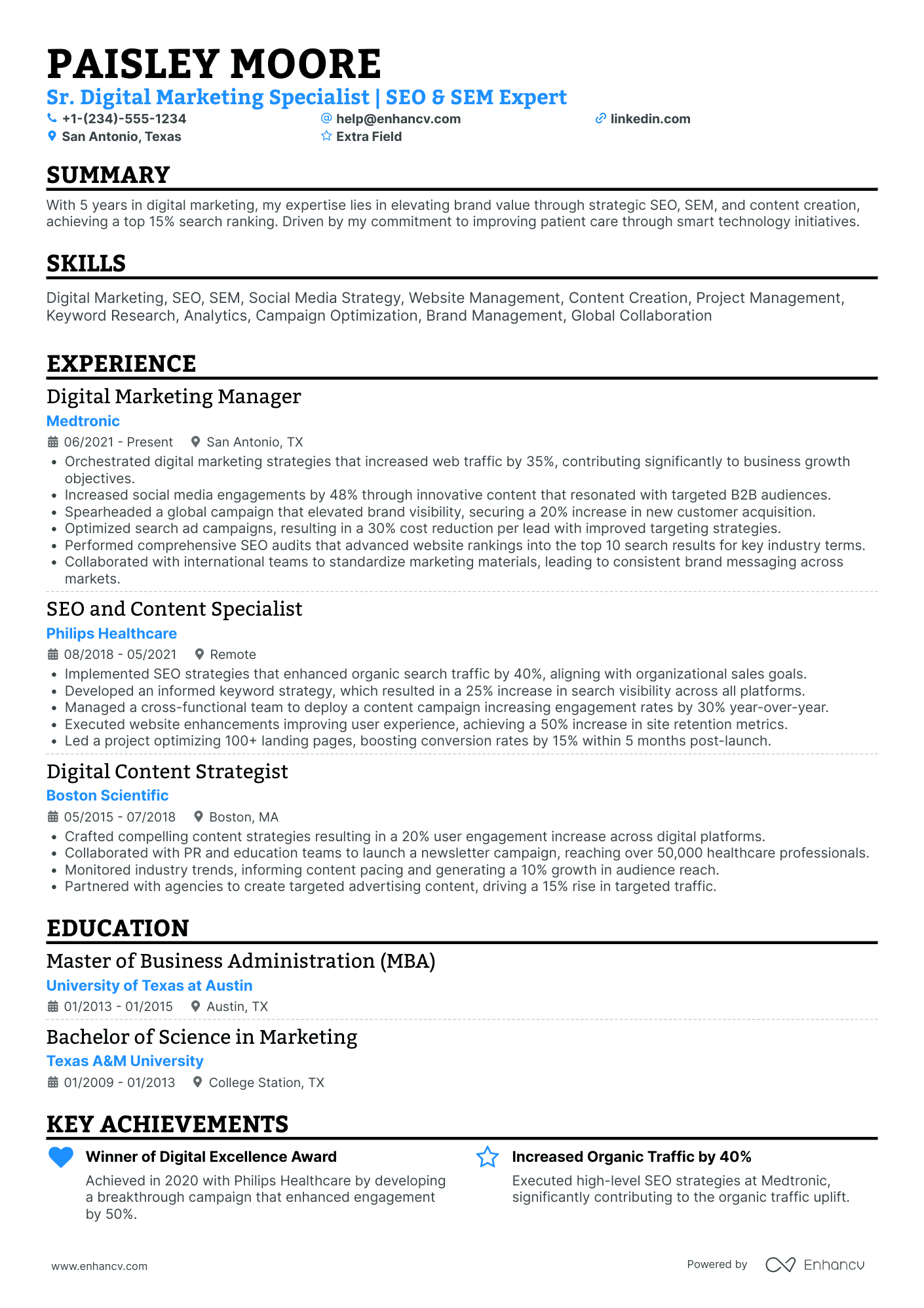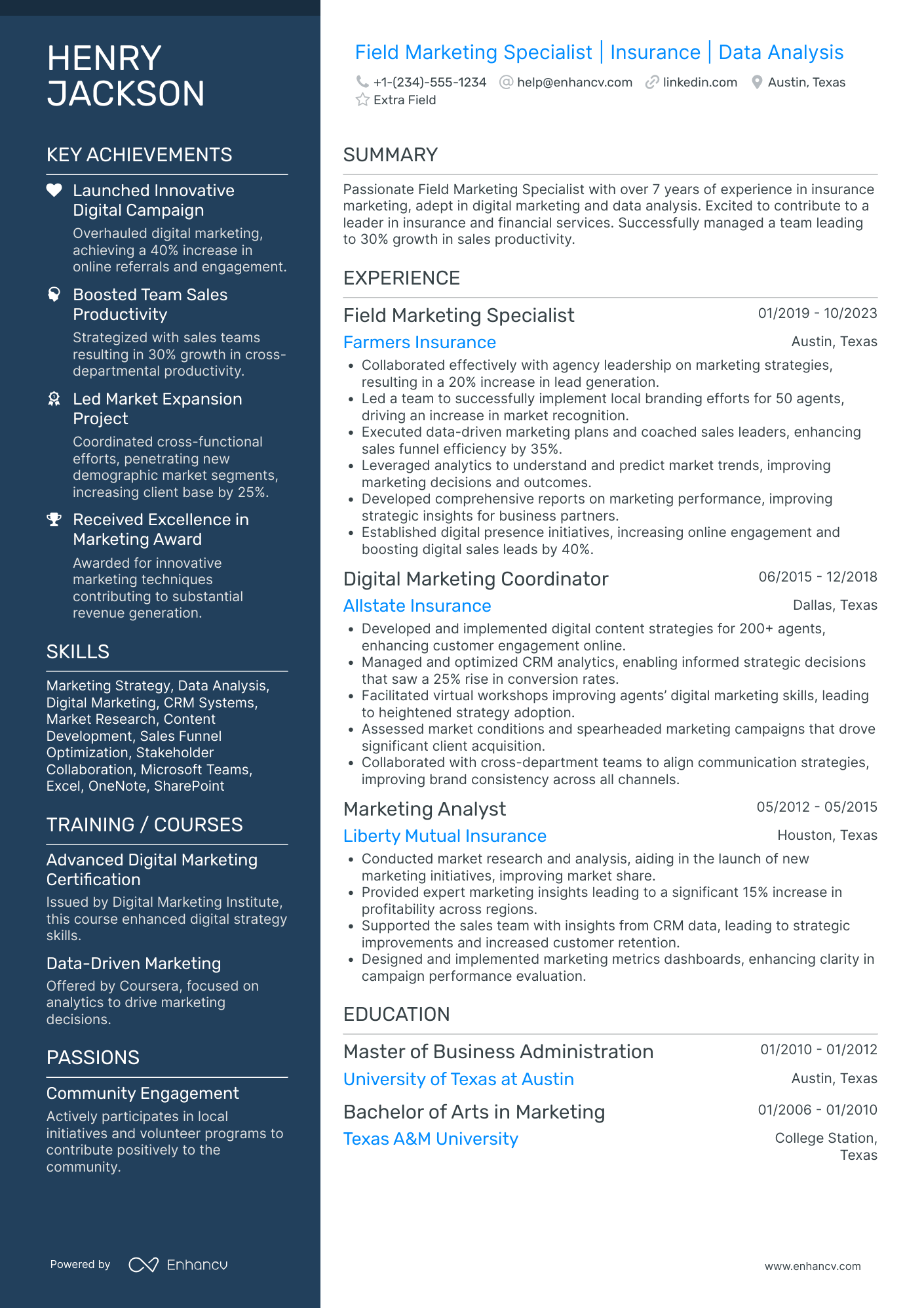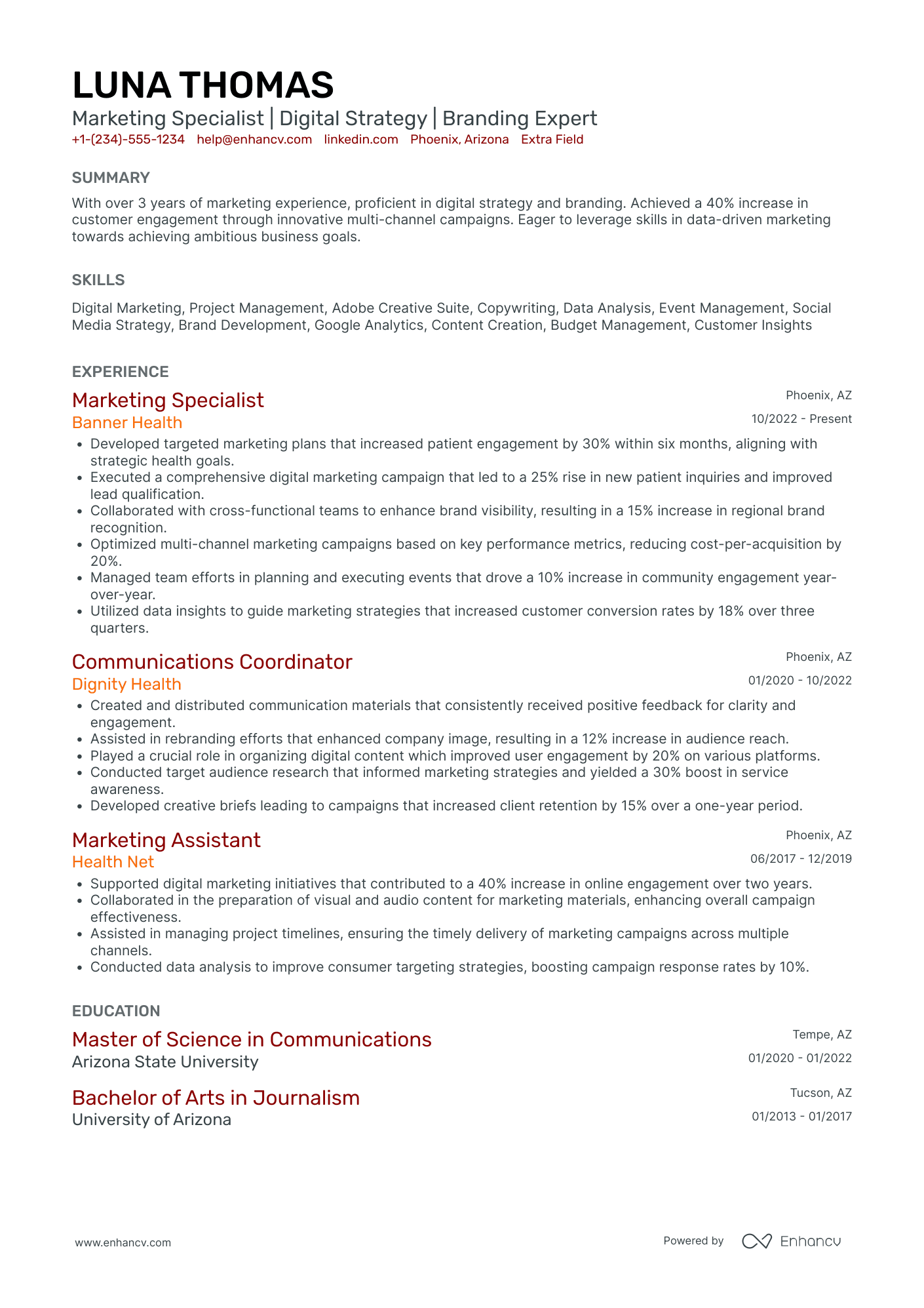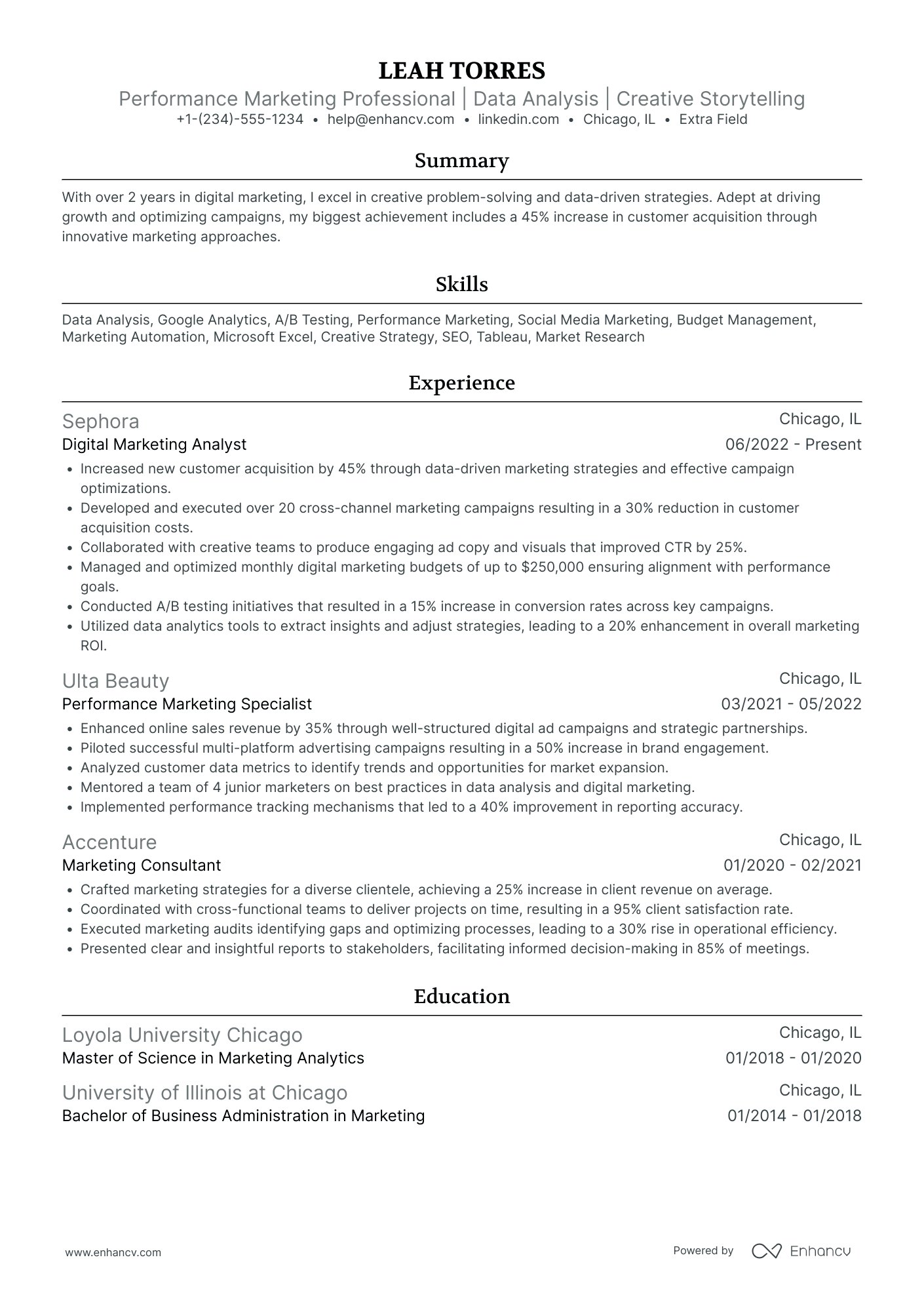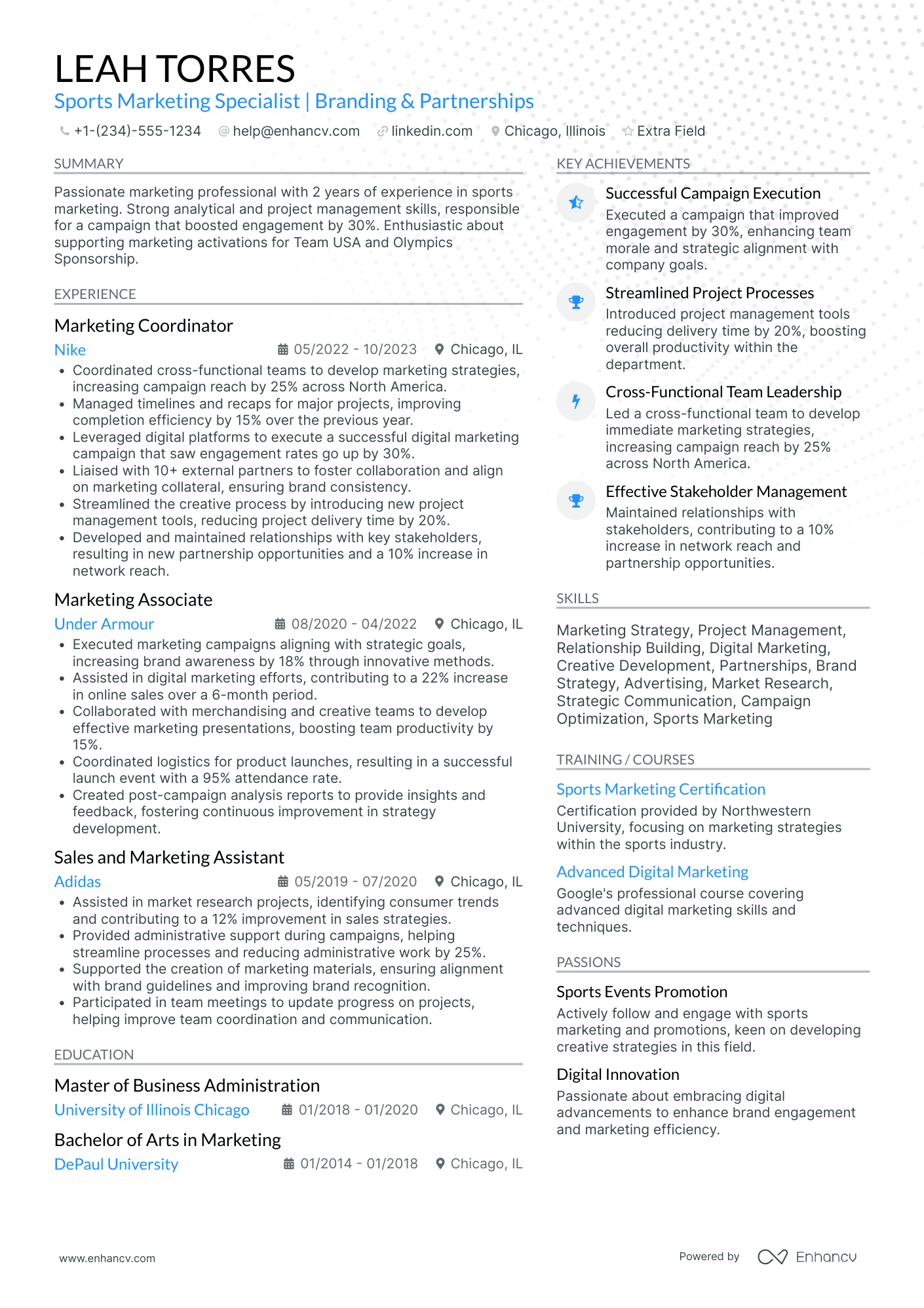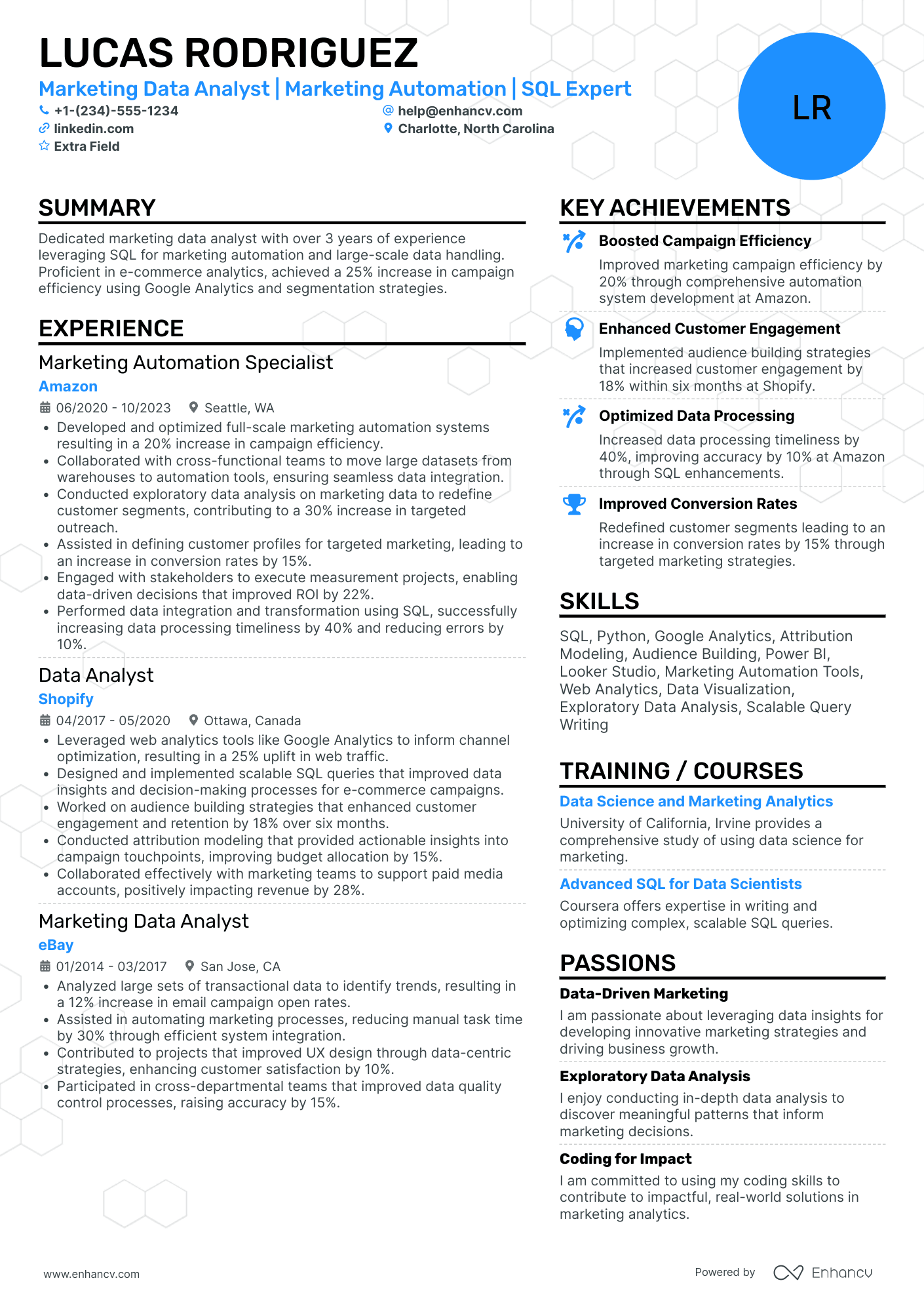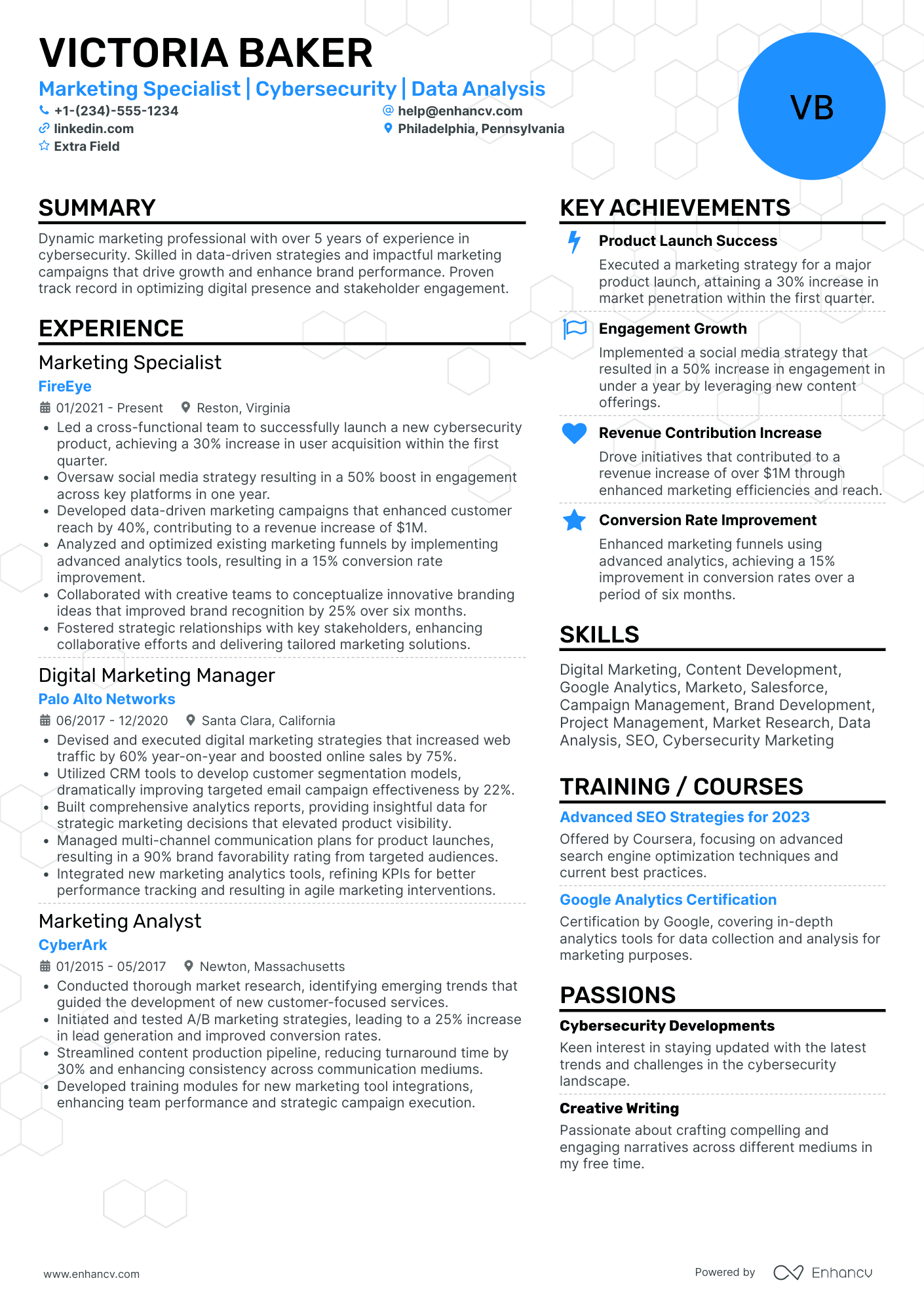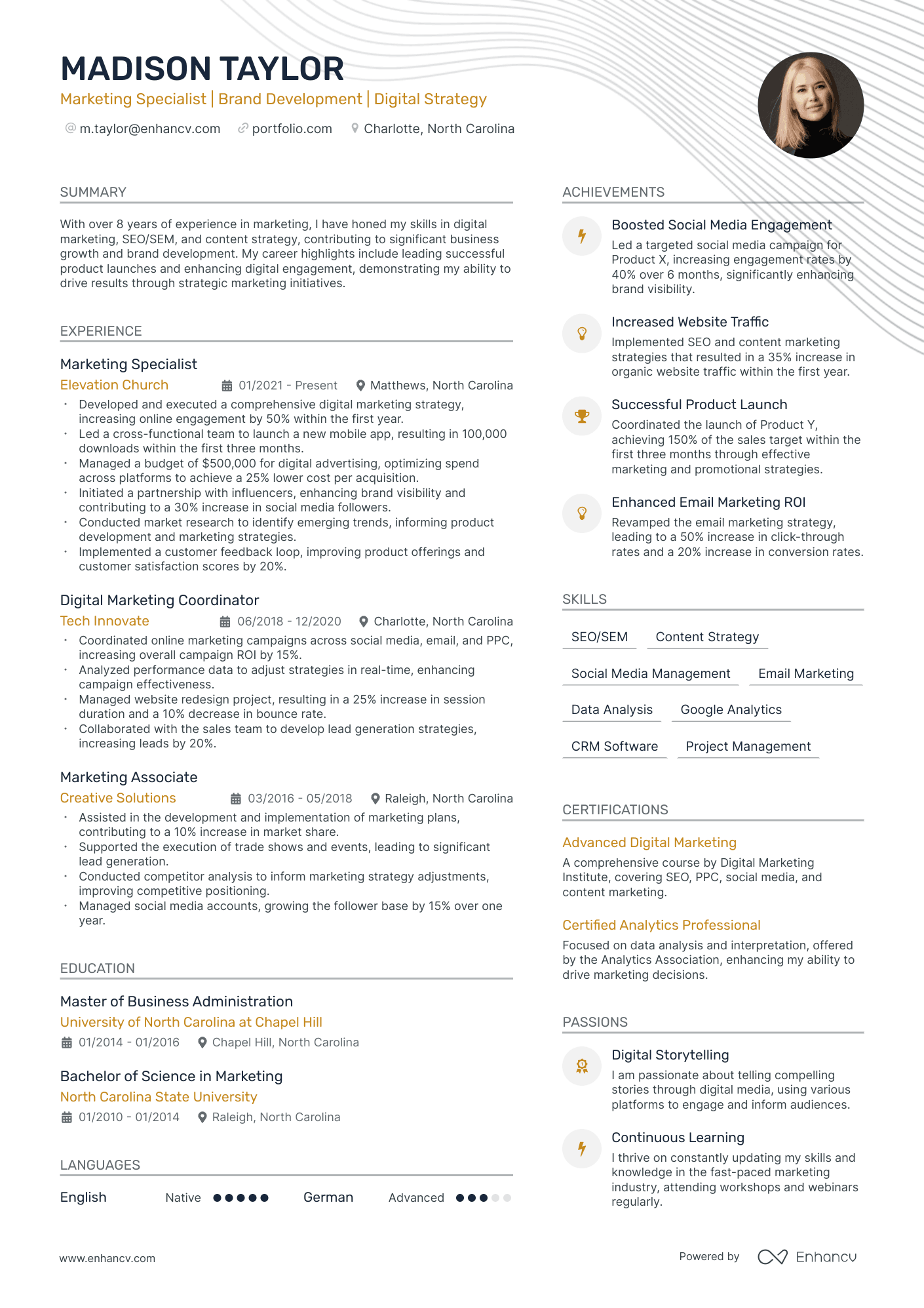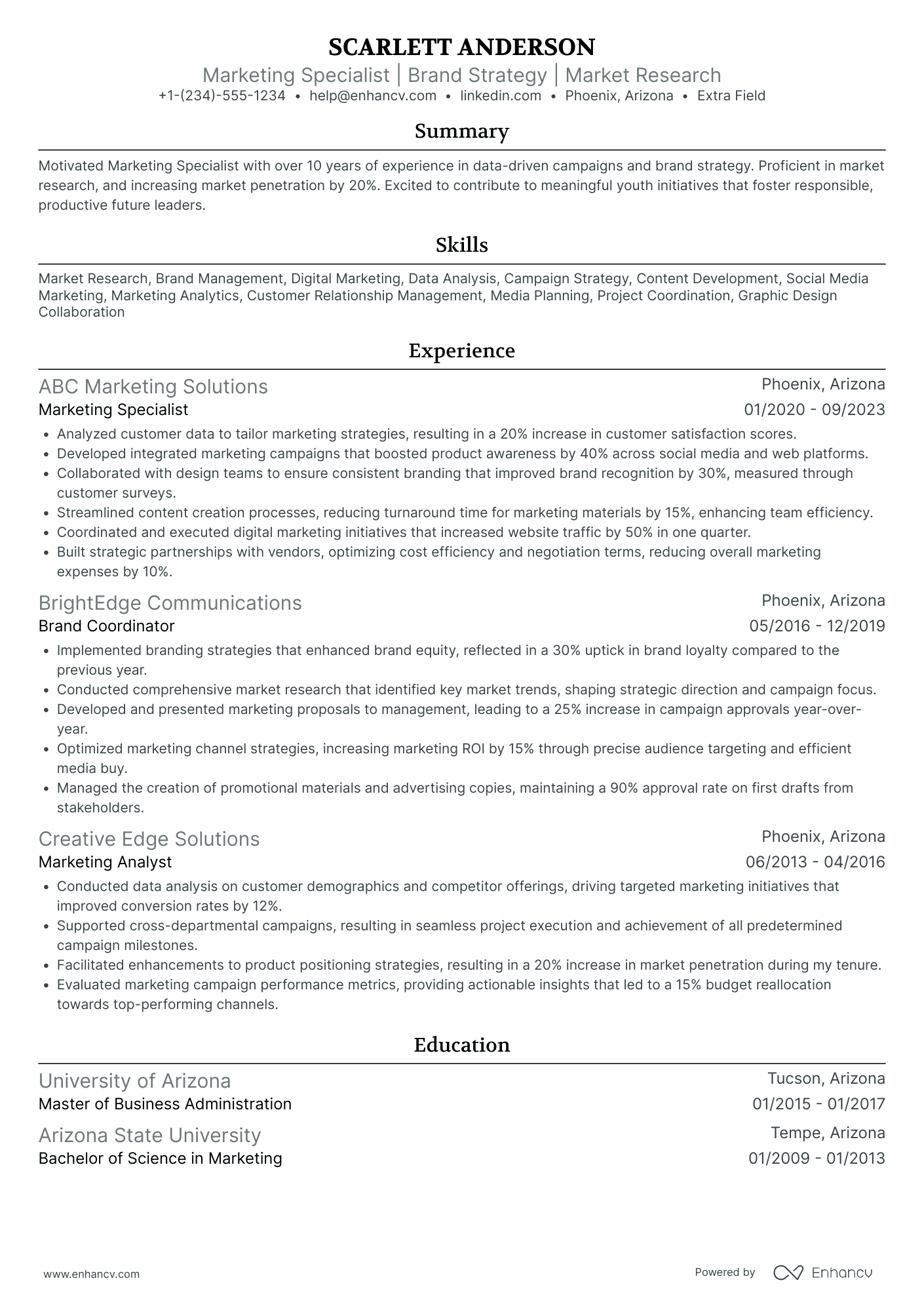The demand for marketing specialists is set to rise in the coming years. No wonder, marketing professionals are the backbone of any organization. Their ability to decode evolving consumer behaviors, master the digital transformation of marketing channels, and navigate fiercely competitive markets places them at the heart of business success.
These savvy specialists don't just keep pace; they craft customer-centric strategies and create brand identities that resonate deeply with audiences.
If this sounds like you, understanding how to translate your extensive expertise into an effective, succinct resume might seem like a challenge. The breadth of your skills and experiences can make it difficult to compress them into a single page.
No worries. This comprehensive guide is crafted precisely for you and will navigate you through:
- Avoiding the generalist label by emphasizing your top skills and capabilities.
- Learning to narrow down your expertise to align with what prospective employers seek.
- Demonstrating a commitment to continuous learning by including upskilling courses and staying up to date with trends and analytics.
- Quantifying your achievements in a way that sets you apart from the competition.
- Differentiating yourself by showcasing your unique personal brand.
A good marketing specialist resume captures the essence of your professional journey but also positions you as the standout candidate you truly are. So let’s see how it’s done.
Dive into our collection of marketing resume guides – we've got dozens to help you shine. Check them out!
- Digital marketing specialist resume
- Marketing resume
- Marketing executive resume
- Marketing specialist cover letter
Marketing specialist resume example
Here’s what this applicant does well in their resume:
- Demonstrates quantifiable achievements in past roles, such as increasing online engagement by 50% and launching a mobile app with 100,000 downloads, which highlights the impact of their work.
- Lists specific skills and certifications relevant to marketing, such as SEO/SEM, Google Analytics, and Advanced Digital Marketing certification, aligning their expertise with industry standards.
- Includes a mix of technical skills and soft skills, like project management and data analysis, showcasing a well-rounded candidate profile.
How to format a marketing specialist resume
There are three basic resume formats you can choose from. The ideal format depends on your work experience and whether you're transitioning to a new industry.
- Reverse chronological resumes are ideal for those with solid experience within their field, emphasizing the experience section with detailed responsibilities and achievements, supported by quantifiable results.
- Functional resumes cater to those with less than 10 years of experience or those shifting careers. It's worth noting that this format is less favored by recruiters as it highlights your skills and how you acquired them.
- Hybrid resumes are great for both experienced and entry-level candidates, as well as career changers. They combine the best of both worlds - often in a two-column layout showcasing experience on one side and skills, strengths, and key achievements on the other.
As for layout and style, be mindful of the following:
- Nail your resume header with marketable info: role description, social media handles, personal website, or portfolio.
- Use a clear, readable font size of 12pt. Marketing resumes allow for a pinch of friendliness, so why not choose Rubik as your main resume font? It’s sleek, quirky, and easy to read.
- Set margins to 1’’ for optimal readability. By the way, our super-simple resume builder adjusts margins (and font size) for you, so you only need to think about the content of your resume.
- Stick to a one-page resume if you have under 10 years of experience; opt for two pages if you have more;
- Always save your resume as a PDF before submitting it to a recruiter.
Align your resume with the market’s standards – Canadian resumes may have unique layout guidelines.
Is your resume good enough?
Drop your resume here or choose a file. PDF & DOCX only. Max 2MB file size.
While your marketing skills may be exceptional, your resume needs the “it” factor to get noticed.
A broad range of experience in several different areas will not impress the recruiter or the hiring manager. Why? Because the position is seeking a “specialist,” not a “generalist.”
To win over the recruiter and land the interview, you have to narrow your career achievements. Find the specific area of marketing that relates to the job posting and focus on just those skills. Show how you’ve mastered that specific area with examples, details, and wins. That’s what makes you valuable as a specialist.
Now, start thinking about your resume based on that “laser-focused” marketing prowess.
Pay close attention to the following resume sections and you’ll get more calls for interviews.
The top sections on a marketing specialist resume
- Professional Experience. A dedicated section to demonstrate your career progression and tangible results in past marketing roles.
- Core competencies. This part details specific marketing skills like SEO, content creation, and data analysis, showcasing your expertise.
- Education & certifications. Lists your academic background and relevant marketing certifications, affirming your professional qualifications and growth mindset.
- Professional summary. A must-have highlighting your marketing prowess and achievements, setting the tone for your resume. A great place to show off your writing skills, too.
- Digital marketing projects. This additional section showcases successful campaigns you've led or contributed to, emphasizing your practical experience.
These bullet points are here for a reason. Recruiters will quickly review your resume, and if it lacks what they're searching for, it may end up in the "rejected" stack.
Therefore, as a marketing specialist aiming to catch the attention of HR managers, make sure your resume ticks off all the items from the list below.
What recruiters want to see on your resume
- Demonstrated expertise in digital marketing tools and platforms. Let’s face it, if you call yourself a marketing specialist, you have to be familiar with tools like Google Analytics, AdWords, and social media management software.
- Proven ability to increase traffic and conversion rates. Recruiters prioritize candidates who can show tangible results, such as growth in website traffic or improved conversion rates.
- Experience in content creation and SEO. The ability to create engaging content and optimize it for search engines is key, as it drives organic traffic and enhances brand visibility.
- Knowledge of data analysis and performance metrics. Recruiters value candidates who can analyze campaign performance and use insights to drive decisions, demonstrating a data-driven approach to marketing.
- Creativity in campaign ideation and execution. A track record of innovative marketing campaigns suggests a candidate can contribute fresh ideas and perspectives, crucial for staying competitive in dynamic markets.
A well-formatted marketing specialist resume is your quickest path to landing an interview. With a layout that's clean, easy to read, and packed with the keywords recruiters seek, you're positioned as a meticulous and dependable applicant.
Now that we've covered the importance of formatting, let's turn our attention to the experience section. This is where you'll articulate your unique value proposition.
How to write a marketing specialist resume experience
A lot of marketing people believe the best route to success is to be what is known as a “T-shaped marketer.” This is someone who develops broad knowledge of a wide range of marketing tactics.
While that can lead to varied career experiences, it lacks the depth and subject matter expertise recruiters look for in a marketing specialist.
The opposite end of the spectrum is an “I-shaped marketer,” who only specializes in one specific field.
That’s good for a beginner, but you’ll need a bit more depth. You should shoot for 2-3 specialties. Anything more is inefficient and doesn’t go deep enough.
A marketing specialist resume should never keep the bullets of the experience section generic, showing off multiple skills instead of results. Like this one:
- •Managed email marketing program for insurance sector business line.
- •Wrote, edited, and approved copy for internal and external audiences.
- •Created campaign materials for digital and traditional media.
- •Managed internal and external brand awareness campaigns.
This candidate makes three major mistakes:
- No quantifiable results. This experience section fails to show measurable outcomes (e.g., web traffic, conversion rate increases, etc.). There’s simply no evidence of effectiveness.
- Lacks keywords. No job-specific keywords (e.g., SEO, digital analytics), risking ATS and recruiter bypass.
- Vague on tools and platforms. It’s important to detail proficiency in essential digital marketing tools (e.g., Google Analytics, CRM).
Check out how another candidate tackles their experience section and take notes.
- •Restructured email templates to include up to 3 visuals, shorter paragraphs, bullet points and calls to action, increasing click rates from 2% to 12%.
- •Optimized website pages with relevant keywords and improved formatting and readability, decreasing bounce rate from 62% to 34%.
- •Revised Facebook marketing strategy, which grew Facebook followers from 1,500 to 4,000 in 4 months and increased overall engagement ~40%.
- •Assessed email bounces to remove invalid and irrelevant contacts, boosting deliverability and open rates by 67%.
This experience section stands out for a few key reasons:
- Focus area. This emphasizes the marketer's specialization in digital marketing. While their knowledge in other marketing areas may vary, it's the concentration on this specific expertise that truly matters.
- Clear results. It shows clear success stories, like boosting click rates and growing social media followers, with actual numbers to back up the claims. This makes it easy to see the candidate's impact.
- Specific actions taken: The candidate explains exactly what they did, such as changing email designs and optimizing web pages. This shows they know how to tackle problems and improve marketing efforts.
- Keywords used. The section includes important terms like "optimized" and "revised strategy," making it more likely to catch the attention of recruiters and ATS..
- Shows proactivity. It's clear the candidate is always looking to make things better, whether that's through updating strategies or cleaning up contact lists. This shows they’re committed to getting better results.
- Technical and analytical skills: By detailing the steps they took and the improvements made, the candidate shows they're good with both technology and data analysis, which are crucial in marketing jobs.
We’ll explore each of those in more detail later in the article. First, let’s see how a marketing specialist can successfully quantify results on their resume.
How to quantify impact on your resume
Unlike roles with easily quantifiable outcomes, marketing achievements can be harder to measure. Marketing specialists must find ways to quantify their results, such as percentage increases in engagement or conversion rates.
Thankfully, tools like SEMrush, Google Analytics, and Ahrefs can provide metrics that specialists can use to highlight their successes in tangible terms.
As a marketing pro you probably already know how to use those, so be sure to include the following:
- Include the percentage increase in website traffic after SEO optimizations to demonstrate your ability to improve online visibility.
- Detail the conversion rate improvement from specific marketing campaigns to show your direct impact on sales or leads.
- Mention the growth in social media followers and engagement rates to highlight your skills in building online communities.
- Specify the cost reduction achieved through more efficient ad spend, showcasing your ability to optimize budgets.
- Report the increase in email open rates and click-through rates after revamping email marketing strategies, indicating your success in enhancing audience engagement.
- Quantify the number of leads generated through digital marketing efforts to underline your contribution to business growth.
- Indicate the ROI (Return on Investment) from marketing campaigns to demonstrate your strategic approach to achieving financial efficiency.
- Document the reduction in bounce rates on key landing pages as a result of your content and design optimizations, proving your skill in improving user experience.
Try to integrate as many of these as possible into your resume's experience section to boost your chances of landing the job.
How to write a marketing specialist resume with no experience
If you've recently graduated and have a keen interest in marketing, you might be considering an internship or a junior position. Figuring out how to differentiate your resume can initially seem challenging, yet there are numerous strategies to capture attention.
As a marketing specialist lacking practical experience, it's crucial to build a resume that emphasizes your transferable skills, relevant academic work, and any activities demonstrating your marketing capabilities. Below are some carefully selected strategies designed for you:
- Emphasize your educational achievements. Highlight any relevant marketing or business courses you've completed. Include specific projects or case studies you’ve worked on.
- Showcase your transferable skills. Creativity, analytical thinking, communication skills, and proficiency in digital tools (e.g., social media platforms, basic SEO knowledge, and content management systems) are highly desirable in marketing roles. Read further about effectively including hard and soft skills in your resume.
- Include your internships and volunteer work. Any internships or volunteer positions that involve marketing tasks (even if not exclusively marketing roles) can be valuable. Detail the responsibilities you had and any positive outcomes or contributions you made.
- List certifications and online courses. If you've taken online courses or earned certifications in digital marketing, content creation, Google Analytics, SEO, or social media management, include these to show your initiative and commitment to learning.
- Detail your projects and personal initiatives. If you've managed a blog, run a social media campaign, or created social media content for platforms like YouTube or Instagram, highlight these experiences. Mention the goals, strategies you implemented, and any success metrics.
- Tailor your resume for each application. Align your resume with the job description of each application. We can’t stress this enough. Use keywords and phrases from the job listing and focus on the relevant skills and experiences that match the role you're applying for.
Remember, your resume is your opportunity to market yourself. Even without direct experience, showcasing your potential, skills, and passion for marketing can make a strong impression on potential employers.
How to list your hard skills and soft skills on your resume
Here’s the deal. Marketing specialists are most valuable when they are capable of driving revenue for their employers.
Given that CEOs often view marketing as a "cost center" instead of a revenue generator, it's crucial to demonstrate your ability to align your efforts with the broader business goals of the company.
Resist the urge to flaunt every single marketing skill you possess in the skills section of your resume. Simply listing everything won't cut it. The real essence of being a marketing specialist lies in carefully selecting which technical and interpersonal skills to highlight, showcasing your proficiency and impact.
Remember, at the end of the day, it's all about showcasing tangible results.
Listing hard skills is pretty straightforward. If you have enough space, you can dedicate a section to them on your resume.
We've made an essential list of technical skills you need to master to ensure your resume makes it through the recruitment process.
Best hard skills for your marketing specialist resume
- SEO (Search Engine Optimization)
- SEM (Search Engine Marketing)
- Content management systems (CMS)
- Email marketing platforms
- Google Analytics
- Social media advertising
- PPC (Pay-Per-Click) advertising
- Graphic design software (Adobe Creative Suite)
- CRM (Customer Relationship Management) software
- Data analysis and visualization tools
- HTML/CSS basics
- Video editing software
- Mobile marketing
- Influencer marketing tools
- A/B testing software
- Market research and analysis tools
- Digital campaign management
- E-commerce platforms
- Automation software
- Conversion rate optimization (CRO) techniques
Unlike hard skills which are acquired through education, training, and experience, soft skills are learned through living and interacting with others. The bigger the range of soft skills you demonstrate, the easier it will be for you to solve problems and collaborate with people at the workplace.
Below is a list of the most common soft skills for marketers.
Best soft skills for your marketing specialist resume
- Communication skills
- Creativity
- Adaptability
- Problem-solving
- Teamwork
- Critical thinking
- Emotional intelligence
- Time management
- Leadership
- Persuasiveness
- Attention to detail
- Initiative
- Empathy
- Stress management
- Organizational skills
- Negotiation
- Customer focus
- Project management
- Conflict resolution
- Analytical thinking
When including soft skills on a resume, it's best to integrate them into your experience and achievements sections, providing concrete examples of how you've applied these skills in practice. This approach will do better justice to your capabilities than simply listing them.
A great way to shine a light on your soft skills is the certifications section of your resume. Read on.
How to list certifications and education on your resume
For many marketing positions, education is more a requirement than a priority. The minimum education level is there to solidify a baseline level of knowledge and maturity.
Still, you can use your education section to draw attention to areas that reinforce your goal for marketing specialization.
For example, if the job posting seeks someone with brand promotion skills, and you happened to do a lot of promotional work for your college or university, then you can list that in the education section. All the extra effort you put into projects, volunteer work, or coursework could be listed here.
If that is not enough, you can even add relevant certifications you have. Often they will show recruiters those precious soft skills that we mentioned above, like lifetime learning, self-motivation, and willingness to stay current with trends.
Best certifications for your marketing specialist resume
- Google Analytics Individual Qualification (GAIQ)
- HubSpot Content Marketing Certification
- Meta Certification
- Hootsuite Social Media Marketing Certification
- Google Ads Certification
When listing your certs, follow these simple steps:
- Create a dedicated section. If you have several relevant certifications, create a separate section titled "Certifications" to draw attention to them.
- List each certification clearly. Provide the full name, followed by the abbreviation in parentheses if commonly used. This makes your resume easily understandable and searchable.
- Include the issuing organization. Mention the name of the organization that issued the certification. This adds credibility and allows employers to verify your qualifications if needed.
- Mention the date of certification. Include the date you received the certification. Also, include the expiration date if applicable to show that your qualification is current.
- Prioritize relevance and recency. List your certifications in reverse chronological order, starting with the most recent. More importantly, list only those most relevant to the job you're applying for near the top.
- Provide details if necessary. If a particular certification is especially relevant or impressive, consider adding a brief description of what the certification entailed, especially if it demonstrates key skills or knowledge that are directly applicable to the job.
How to write a marketing specialist resume summary or objective
We've saved the best for last. Trust us, crafting your career summary at the end of the resume-building process is a smart move. By this point, you've likely detailed all your qualifications and professional experience, leaving just one task: eloquently summarizing your expertise and goals within a few sentences.
More often than not, this section will be the most impactful part of your resume. If not done effectively, you risk being overlooked among top applicants.
So, how do we approach summary writing?
As a marketer, you’ve been trained on how to translate features into benefits. But remember to stay focused. Your resume summary needs to stay specific to the position you’re applying for. Writing a generic description of your broad experience will put you in the “generalist” category.
There are several specialized areas where you can apply your expertise:
- Content
- Product
- Digital
- Social media
- Demand generation
- Lead generation
- Advertising
Having 4 specialties is over the top. Listing 3 specialties is better, but showing solid expertise in 2 specialties specifically related to the job posting is the key to success.
For example, if the company wants someone who can provide leads to the sales team, skip listing social media skills.
List only the areas that will interest the recruiter and separate you from the crowd of applicants.
Let’s look at the examples.
This candidate clearly has trouble presenting themselves. Here’s why:
- Too vague. The summary lacks specific details about achievements and uses broad terms without offering concrete examples.
- Overused phrases. Terms like "driven and motivated" are often overused in resumes and don't distinguish the candidate from others.
- Missing quantifiable achievements. It doesn't include any numbers or results to back up claims of success.
- Lacks specialization. While claiming expertise in "all facets of marketing," it doesn't specify any particular area of strength.
- No mention of results. It doesn't articulate the outcomes of managing omnichannel campaigns, such as increased engagement or sales, leaving the reader questioning the impact of the candidate's work.
Bland, right? Also note that the length is more suited for a resume objective, rather than a summary. Unlike summaries which are 3-5 sentences long and focus on your achievements and value proposition, objectives are shorter and more suited for entry-level positions.
Check out the improved version below.
How does this version stand out?
- Special skills highlighted. It points out the candidate's strong skills in important areas like SEO and using social media for business, showing they have the right knowledge for the job.
- Clear results. The summary shows real results, like increasing web traffic by 40% and getting twice as many people engaged on social media, proving the candidate knows how to make a big impact.
- Proven success. Mentioning a 25% increase in sales from campaigns shows the candidate can handle big projects and get good results.
- Data-driven approach. Talking about using data to make decisions shows the candidate is smart about analyzing information to improve their work. (That’s what we meant by weaving soft skills into various resume sections).
- Focused on outcomes. It emphasizes the candidate's focus on achieving goals that can be measured, which is exactly what companies are looking for.
- Inclusion of buzzwords: Including “dynamic”, “excels”, “committed” and "growth hacking" adds a modern touch and shows the candidate can express themselves eloquently.
That's fantastic. But perhaps you think you have more to offer and want to secure that interview. Keep reading to discover how to enhance your resume with projects that are relevant to the job you're aiming for.
Optimize your resume summary and objective for ATS
Drop your resume here or choose a file.
PDF & DOCX only. Max 2MB file size.
Additional sections for a marketing specialist resume
Your skills and achievements may range from highly specific to quite unique, but when applying for a job, it's best to leave hobbies like skydiving off your resume. Space is limited, so only include personal activities that are relevant to the position you're applying for. For instance:
- A portfolio: Showcasing your work can give potential employers a better sense of your skills and experience. Ensure the portfolio is relevant to the job you're applying for, well-organized, and easy to navigate. For optimal space usage, include a link to it in the header.
- Projects: If you've worked on any high-impact marketing projects or campaigns, detail them in a separate section and include tangible results.
- A custom section: “Interests” or a "My Time" sections can effectively present your passions and how your skills manifest in different areas of your life, offering recruiters a glimpse into your personality. Again, ensure that whatever you include here is related to the qualities expected of a marketer.
Another very popular section with marketing specialists is “Awards”. There are so many competitions out there! Check out the best practices below.
How to add awards to your resume
You might wonder why you need a dedicated section for this. In a sea of candidates, it's crucial to stand out in any way you can.
Indeed, an awards section serves as another platform to highlight your professional expertise, with the added benefit of carrying a stamp of approval.
Here's what you need to know:
- Use bullet points for clarity. Organize the awards in bullet points for easy readability.
- Be descriptive yet concise. For each award, provide a brief description that includes the name of the award, the granting organization, and the date received. If space allows, include a short explanation of why the award was given.
- Prioritize relevance and prestige. List awards that are most relevant to the job you're applying for first. If you have received awards from prestigious organizations or industry-recognized bodies, make sure these are prominently featured.
Key takeaways
Crafting a standout resume as a marketing specialist isn't just about listing experiences—it's about strategically curating content that sells your unique brand. Here's how to ensure your resume not only highlights your strengths but also captivates potential employers, setting the stage for that exciting interview.
- Avoid being labeled as a generalist by carefully selecting which experiences and skills to include in your resume.
- Master the art of showcasing results on your resume to highlight your impact.
- Determine which elements to prioritize—skills, certifications, or experience—when crafting your resume.
- Decide on additional sections to include, ensuring your strengths are both relevant and compelling.
Marketing Specialist resume examples
By Experience
By Role
